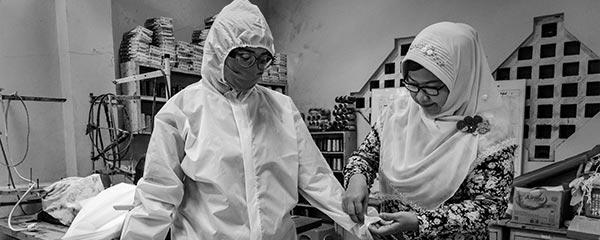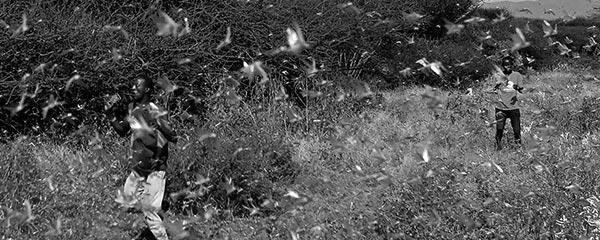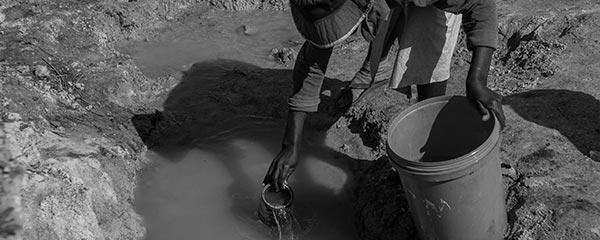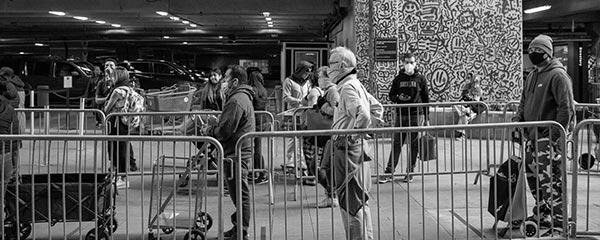Story Highlights
- African countries round out the top 12 populations plagued by health problems
- 51% sub-Saharan Africa dissatisfied with availability of quality healthcare
- Six in 10 (60%) aged 60 or older report health problems
WASHINGTON, D.C. -- Since sub-Saharan Africa reported its first confirmed case of COVID-19 in late February in Lagos, Nigeria, African governments and much of the international health community have prepared for a potential humanitarian calamity. And yet, two and a half months later, the region has roughly 10,000 confirmed cases and fewer than 700 deaths to date.
While African populations and their national health systems continue to prepare for the potential for increased transmission across the continent, recent World Poll data indicate how Africa might handle a virus that has already stretched health systems in some rich countries to the breaking point.
Among 144 countries and areas polled in 2019, the 12 countries with the highest percentage of their population experiencing health problems were all found in sub-Saharan Africa. Chad, Guinea, Comoros and Eswatini led the world, with at least half of adults in those countries reporting health problems that prevent them from doing what people their age normally do.
Adults in sub-Saharan Africa in general consistently report high rates of underlying health problems. In 2019, nearly three in 10 (28%) said they have health problems that prevent them from doing things people their age normally can do. This is similar to rates in former Soviet States (29%), but it is significantly higher than in regions such as Europe (20%) and Asia (24%) where the coronavirus has already taken a huge toll.
The elderly and those with comorbidities are at an elevated risk once infected with the coronavirus. According to a recent paper in the Lancet Infectious Diseases Journal, those infected over age 60 have a fatality rate three times higher than those under 60 (4.5% vs. 1.4%). Among Africans in this most vulnerable age group, six in 10 (60%) report health problems, which is again higher than the percentages in Europe and Asia.
| Yes overall | Aged 60+ | ||||||||||||||||||||||||||||||||||||||||||||||||||||||||||||||||||||||||||||||||||||||||||||||||||
|---|---|---|---|---|---|---|---|---|---|---|---|---|---|---|---|---|---|---|---|---|---|---|---|---|---|---|---|---|---|---|---|---|---|---|---|---|---|---|---|---|---|---|---|---|---|---|---|---|---|---|---|---|---|---|---|---|---|---|---|---|---|---|---|---|---|---|---|---|---|---|---|---|---|---|---|---|---|---|---|---|---|---|---|---|---|---|---|---|---|---|---|---|---|---|---|---|---|---|---|
| % | % | ||||||||||||||||||||||||||||||||||||||||||||||||||||||||||||||||||||||||||||||||||||||||||||||||||
| Former Soviet Union | 29 | 63 | |||||||||||||||||||||||||||||||||||||||||||||||||||||||||||||||||||||||||||||||||||||||||||||||||
| Sub-Saharan Africa | 28 | 60 | |||||||||||||||||||||||||||||||||||||||||||||||||||||||||||||||||||||||||||||||||||||||||||||||||
| Asia | 24 | 45 | |||||||||||||||||||||||||||||||||||||||||||||||||||||||||||||||||||||||||||||||||||||||||||||||||
| Middle East and North Africa | 23 | 60 | |||||||||||||||||||||||||||||||||||||||||||||||||||||||||||||||||||||||||||||||||||||||||||||||||
| Americas | 21 | 38 | |||||||||||||||||||||||||||||||||||||||||||||||||||||||||||||||||||||||||||||||||||||||||||||||||
| Europe | 20 | 41 | |||||||||||||||||||||||||||||||||||||||||||||||||||||||||||||||||||||||||||||||||||||||||||||||||
| Ranked by percentage yes | |||||||||||||||||||||||||||||||||||||||||||||||||||||||||||||||||||||||||||||||||||||||||||||||||||
| ║┌┴¤═° World Poll, 2019 | |||||||||||||||||||||||||||||||||||||||||||||||||||||||||||||||||||||||||||||||||||||||||||||||||||
Majority in Sub-Saharan Africa Dissatisfied With Availability of Quality Care
African health systems suffer from a chronic lack of funds, doctors and equipment. Ventilators, key in the treatment of COVID-19 patients, are in short supply: Sierra Leone has 13, Liberia and the Central African Republic each have three. Sub-Saharan Africa averages 0.2 physicians per 1,000 people, compared with 2.9 in wealthy OECD countries. And while the U.S. can deliver $100 billion in funds to hospitals and community health centers through its recent stimulus bill, cash-strapped African governments are unlikely to be able to raise funds quickly enough to confront a potential crisis.
These shortcomings are reflected in Africans' attitudes toward their own healthcare systems. A slim majority of adults in sub-Saharan Africa (51%) are dissatisfied with the availability of quality healthcare in their communities. Still, these percentages soar far higher than the average in a number of countries, including Gabon and Mauritania, which rank among the most dissatisfied countries in the world.
| Dissatisfied | |||||||||||||||||||||||||||||||||||||||||||||||||||||||||||||||||||||||||||||||||||||||||||||||||||
|---|---|---|---|---|---|---|---|---|---|---|---|---|---|---|---|---|---|---|---|---|---|---|---|---|---|---|---|---|---|---|---|---|---|---|---|---|---|---|---|---|---|---|---|---|---|---|---|---|---|---|---|---|---|---|---|---|---|---|---|---|---|---|---|---|---|---|---|---|---|---|---|---|---|---|---|---|---|---|---|---|---|---|---|---|---|---|---|---|---|---|---|---|---|---|---|---|---|---|---|
| % | |||||||||||||||||||||||||||||||||||||||||||||||||||||||||||||||||||||||||||||||||||||||||||||||||||
| Gabon | 75 | ||||||||||||||||||||||||||||||||||||||||||||||||||||||||||||||||||||||||||||||||||||||||||||||||||
| Mauritania | 73 | ||||||||||||||||||||||||||||||||||||||||||||||||||||||||||||||||||||||||||||||||||||||||||||||||||
| Togo | 70 | ||||||||||||||||||||||||||||||||||||||||||||||||||||||||||||||||||||||||||||||||||||||||||||||||||
| Liberia | 69 | ||||||||||||||||||||||||||||||||||||||||||||||||||||||||||||||||||||||||||||||||||||||||||||||||||
| Congo Brazzaville | 65 | ||||||||||||||||||||||||||||||||||||||||||||||||||||||||||||||||||||||||||||||||||||||||||||||||||
| Chad | 63 | ||||||||||||||||||||||||||||||||||||||||||||||||||||||||||||||||||||||||||||||||||||||||||||||||||
| Comoros | 63 | ||||||||||||||||||||||||||||||||||||||||||||||||||||||||||||||||||||||||||||||||||||||||||||||||||
| Madagascar | 60 | ||||||||||||||||||||||||||||||||||||||||||||||||||||||||||||||||||||||||||||||||||||||||||||||||||
| Sierra Leone | 60 | ||||||||||||||||||||||||||||||||||||||||||||||||||||||||||||||||||||||||||||||||||||||||||||||||||
| Mali | 58 | ||||||||||||||||||||||||||||||||||||||||||||||||||||||||||||||||||||||||||||||||||||||||||||||||||
| Ranked by percentage yes | |||||||||||||||||||||||||||||||||||||||||||||||||||||||||||||||||||||||||||||||||||||||||||||||||||
| ║┌┴¤═° World Poll, 2019 | |||||||||||||||||||||||||||||||||||||||||||||||||||||||||||||||||||||||||||||||||||||||||||||||||||
Implications
Experts have struggled to explain the virus' still-limited foothold in sub-Saharan Africa. Some have said that the region's warmer climate has slowed its spread or that the lead time governments had to close borders limited its arrival. Less positively, others put forward that testing regimes remain too poor to identify the growth of the virus, though today, more than 40 African countries can test for COVID-19, up from just two in February.
To its advantage, sub-Saharan Africa remains home to the world's youngest population, with an estimated 60% of residents younger than age 25. Africa simply has proportionally fewer older adults who are much more likely to be at risk from the coronavirus. Further, many African countries are already deeply experienced in handling infectious diseases, while several are veterans of recent Ebola outbreaks in West Africa and the Democratic Republic of Congo.
Still, Africa's poorly funded and under-resourced healthcare systems leave it in a perilous position should COVID-19 take root. High instances of underlying health issues such as HIV and tuberculosis, which compromise immune systems, leave large swathes of African populations uniquely vulnerable.
Africa has thus far been fortunate to largely escape the worst effects of this global pandemic. However, should transmission increase as it has in parts of southern Europe or the U.S., African countries remain in a difficult position to effectively combat it with potentially devastating consequences.




